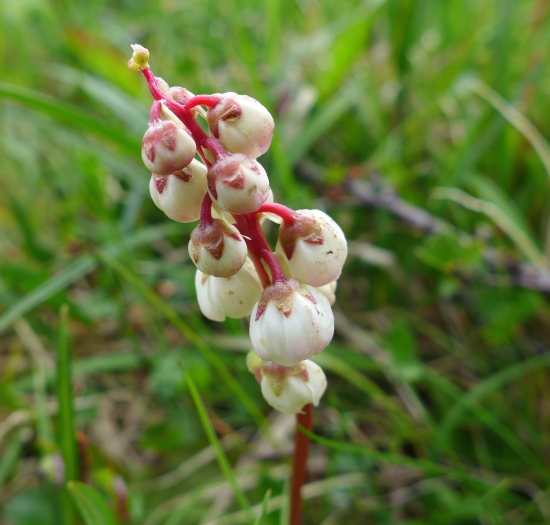Common Wintergreen
(Pyrola minor)
Common Wintergreen (Pyrola minor)
/
/

icosahedron
CC BY 4.0
Image By:
icosahedron
Recorded By:
Copyright:
CC BY 4.0
Copyright Notice:
Photo by: icosahedron | License Type: CC BY 4.0 | License URL: http://creativecommons.org/licenses/by/4.0/ | Rights Holder: icosahedron | Publisher: iNaturalist | Date Created: 2014-07-15T03:26:06-07:00 |

























Estimated Native Range
Summary
Pyrola minor, commonly known as Common Wintergreen, is a perennial herb native to coniferous and mixed forests, as well as moist, shaded areas in the circumboreal region, which includes northern latitudes of Eurasia and North America. It typically forms low-growing clumps reaching 4 to 6 inches (10 to 15 cm) in height. The plant features a basal rosette of rounded, evergreen leaves from which slender flowering stalks arise. From late spring to midsummer, it bears small, nodding, bell-shaped flowers that are white to pinkish, with a subtle, waxy appearance. The flowers are not particularly showy but add a delicate charm to woodland gardens.
Common Wintergreen is appreciated for its evergreen foliage, which provides year-round interest, and its ability to thrive in the dappled shade of forest understories. It is often used in shaded rock gardens, woodland plantings, and as ground cover in areas with cool summers. It prefers moist, well-drained, acidic soils rich in organic matter and requires consistent moisture without waterlogging. While generally low-maintenance, it can be sensitive to drought and excessive heat. In some traditional medicine systems, Pyrola minor is used for its purported anti-inflammatory and analgesic properties.CC BY-SA 4.0
Common Wintergreen is appreciated for its evergreen foliage, which provides year-round interest, and its ability to thrive in the dappled shade of forest understories. It is often used in shaded rock gardens, woodland plantings, and as ground cover in areas with cool summers. It prefers moist, well-drained, acidic soils rich in organic matter and requires consistent moisture without waterlogging. While generally low-maintenance, it can be sensitive to drought and excessive heat. In some traditional medicine systems, Pyrola minor is used for its purported anti-inflammatory and analgesic properties.CC BY-SA 4.0
Plant Description
- Plant Type: Shrub, Herb
- Height: 0.5-0.8 feet
- Width: 0.5-0.8 feet
- Growth Rate: Slow
- Flower Color: Pink, White
- Flowering Season: Summer
- Leaf Retention: Evergreen
Growth Requirements
- Sun: Part Shade, Full Shade
- Water: Medium
- Drainage: Medium
Common Uses
Low Maintenance
Natural Habitat
Coniferous and mixed forests, as well as moist, shaded areas
Other Names
Common Names: Lesser Wintergreen, Snowline Wintergreen
Scientific Names: , Pyrola minor, Amelia minor, Braxilia minor, Braxilia parvifolia, Erxlebenia minor, Erxlebenia rosea, Pirola minor, Pyrola conferta, Pyrola conferta
GBIF Accepted Name: